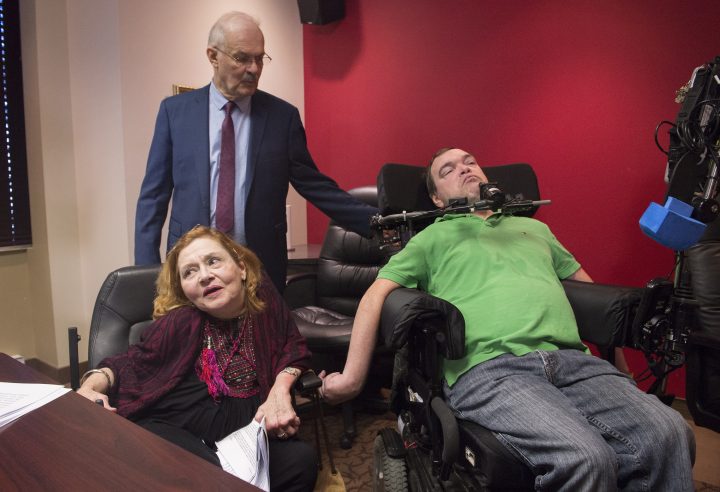Medically-assisted dying became a discussion point on the second day of the 2019 federal election trail, as leaders reacted to a ruling by the Quebec Superior Court that part of the country’s law is “unconstitutional.”

On Wednesday, a Quebec judge ruled that both the province’s and country’s laws on assisted dying were too restrictive and therefore discriminated against some who sought the procedure.
Justice Christine Baudouin took aim at the Criminal Code requirement that a natural death be “reasonably foreseeable” before someone can be eligible for assisted death. The condition has prevented some people from accessing the end-of-life procedure. She also invalidated a section of the Quebec law that says people must “be at the end of life.”
The “reasonably foreseeable” requirement does not include specifics on time, instead Health Canada describes it as “a period of time that is not too distant.”
“You do not need to have a fatal or terminal condition to be eligible for medical assistance in dying,” it adds.
How federal leaders reacted
Conservative Leader Andrew Scheer said his party had been against the law, introduced in 2016, from the outset.
“I will continue to study the decision,” Scheer said, while speaking in French.
“It’s a very, very important decision, which will touch the lives of potentially a lot of Canadians.”
Scheer said the party will release an official statement on the issue in the coming days.
WATCH: Trudeau comments on medically assisted dying law

New Democrat Leader Jagmeet Singh also said the Quebec ruling shows there were shortcomings in the law.
“We see that some of the criteria are too specific, too narrow and it doesn’t reflect all the situations that can occur,” Singh said, speaking with reporters.
Singh noted that he is prepared to have a “larger conversation” on the issue and make the necessary changes.
Liberal Leader Justin Trudeau responded to the ruling Thursday, saying, “This is an important issue for our country. This continues to be a discussion, including in front of the courts, and there will be future steps to take as a government, so we will be reading that ruling very closely and carefully before we make any future decisions.”
Global News reached out to the Bloc Quebecois and the Green Party over email on whether they would push for the issue to be reevaluated, but did not hear back by time of publication.
More on legal challenges
Attention paid to the issue was welcomed by those behind the legal challenge. Nicole Gladu and Jean Truchon both suffer from incurable illnesses but had seen previous requests for an assisted death under the law denied.
Gladu told reporters the Quebec ruling has made her feel more “free.”
“It’s up to people like us to decide if we prefer the quality of life to the quantity of life,” Gladu said.
Jean-Pierre Menard, a lawyer for the two Quebecers, had argued that a 2015 Supreme Court of Canada decision decriminalizing medical assistance in dying established suffering — not imminent death — as the most important consideration.
WATCH: Singh says he’s ‘open to’ improving access to medically-assisted death

Menard said Thursday that he hopes both the provincial and federal governments review their laws in light of the Quebec ruling — rather than try to appeal the decision.
Jocelyn Downie, a professor at the Schulich School of Law at Dalhousie University, explained to Global News that the ruling itself is “extremely significant” for those who sought access to the procedure.
“It is a very, very robust rejection of the ‘reasonably foreseeable’ criteria for access,” she said.
Downie said that Quebec and the federal government must now decide if they will challenge and appeal the ruling. If that does happen, the issue could eventually end up at the Supreme Court of Canada.
“The Crown would be arguing that the court got it wrong as to what the Charter requires of MAID legislation,” she explained.
Quebecers aren’t the only ones taking action on the assisted dying law.
The British Columbia Civil Liberties Association, which applauded the Quebec decision, is also in the process of fighting a similar challenge.
Medically assisted dying in Canada
According to data released by Health Canada in April, nearly 7,000 Canadians received medical help to end their lives since Canada legalized assisted dying three years ago.
That amounts to roughly one per cent of all deaths in Canada.
Health Canada says assisted deaths were provided primarily by physicians, with less than 10 per cent provided by nurse practitioners.
WATCH: Ontario court rules religious doctors must refer for medically assisted deaths

The report did not include any country-wide statistics on how many Canadians have been denied medical assistance in dying.
However, the report noted the most commonly-cited reasons for denying a request for assisted death were “loss of competency” and that the patient’s natural death was not “reasonably foreseeable,” as required by law.
— With files from Global News reporter Heather Yourex-West, The Canadian Press





Comments